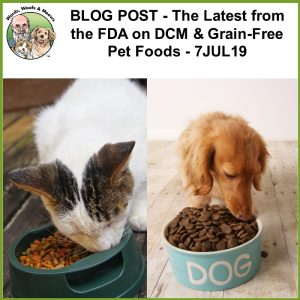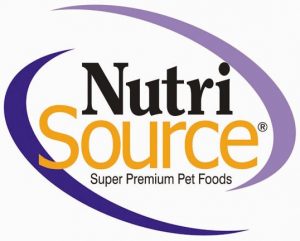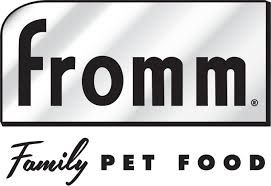< A short link to this post – http://bit.ly/FDA-DCM-Food-7JUL19 >
 If you are concerned about the latest news from the FDA and Grain-Free pet foods, please take the time to read this post. Much of what you hear in the mass media is misleading. Here are some of the facts.
If you are concerned about the latest news from the FDA and Grain-Free pet foods, please take the time to read this post. Much of what you hear in the mass media is misleading. Here are some of the facts.
- There is currently no FDA recall of any brand of pet food related to canine dilated cardiomyopathy (DCM).
- While the loss of a pet to DCM is tragic, there have been only 524 cases reported to the FDA since January 1, of 2014 out of an estimated 77 million dogs in the USA. The number of dogs corresponds to 0.000007% of cases possibly being related to diet.
- Genetics plays a significant role in DCM, with typically larger breeds being more predisposed. The majority of these reports have been submitted in the last year, suggesting an increase in reporting.
- While the situation certainly warrants further investigation, there is currently no corroborating scientific evidence that the increased cases in DCM are related to diet.
From the FDA
On June 27, 2019, the Food and Drug Administration issued a press release entitled FDA Investigation into Potential Link between Certain Diets and Canine Dilated Cardiomyopathy updating the investigation that began a year ago based on reports of canine dilated cardiomyopathy (DCM) in dogs eating certain pet foods, many labeled as “grain-free.” In my opinion, the most significant statement in this press release is “Based on the data collected and analyzed thus far, the agency believes that the potential association between diet and DCM in dogs is a complex scientific issue that may involve multiple factors.” In other words, there is still much research that needs to be done, and at this point, we can still not draw any definitive conclusions as to the specific cause for the rise in cases of DCM.
Other statements of note in the FDA press release include:
“The American Veterinary Medical Association estimates that there are 77 million pet dogs in the United States. Most dogs in the U.S. have been eating pet food without apparently developing DCM.” [ Emphasis added ]
“Another puzzling aspect of the recent spike in DCM cases is that they have occurred just in the last few years. The FDA is working with the pet food industry to better understand whether changes in ingredients, ingredient sourcing, processing or formulation may have contributed to the development of DCM.” [ Emphasis added ]
Grain free foods have been available for many years, with increases in DCM only reported recently. As previously indicated by the FDA, the possible link between diet and DCM may be based on a variety of factors, and there is still much research to be done. The FDA press release encourages anyone with a pet that is showing possible signs of DCM or other heart conditions (decreased energy, cough, difficulty breathing, and episodes of collapse) to seek veterinary care immediately. That is excellent advice and will help to further our understanding of any link between DCM, diet, and genetics as well as other possible environmental factors that may be at play.
While the FDA report lists several brands of food that have been reported to have been fed to pets diagnosed with DCM, they did not list all brands nor specific formulas; this is unfortunate. If there is a link between DCM and diet, it would be beneficial to know which specific formulas are involved, as not all formulas of a particular brand may be of concern.
Green Acres Kennel Shop sells food from three of the companies on the list; Fromm, NutriSource, and Zignature. Each of the companies has contacted us, and they want to get to the bottom of this as much as the FDA, maybe even more so. All three are family-owned companies that are genuine pet lovers that have been producing some of the highest quality pet foods in the world for many decades. I have included parts of their responses below. If you would like a full copy of their response, please stop by the store.
NutriSource/PureVita/Natural Planet/Tuffy’s – In addition to your pet’s overall health, transparency is of the utmost importance to us. On June 27, 2019, the United States Federal Food and Drug Administration  (FDA) put a multitude of brands, along with NutriSource, in the position of defending ourselves in a confusing situation about grain-free dog diets and their potential link to canine dilated cardiomyopathy (DCM).
(FDA) put a multitude of brands, along with NutriSource, in the position of defending ourselves in a confusing situation about grain-free dog diets and their potential link to canine dilated cardiomyopathy (DCM).
- The comprehensive health of EVERY SINGLE pet is extremely important to us. We are continuing our efforts to study DCM and closely monitor all the information that the FDA can provide. The FDA’s published updates have not concluded that there is a causal relationship between diet and DCM. [ Emphasis added ]
- All NutriSource diets include supplemental TAURINE to boost naturally occurring levels derived from our high quality meats and fish. Due to the potential link between taurine-deficiency and DCM, we felt it important to take this step as a safeguard to protect pets until scientific research is complet [ Emphasis added ]
- We have committed funds for additional research on our diets and initial results have shown that our products deliver the recommended nutrients to support normal levels of taurine.
- We have proactively funded independent research at Kansas State University to study pet health including the issue of canine DCM. [ Emphasis added ]
< Click to read Tuffy’s July 1, 2019 message regarding DCM concerns. >
Fromm response – Although no conclusive evidence relating diet to DCM has been scientifically substantiated, each of the recipes in our full line of grain-inclusive and grain-free dry foods is  supplemented with taurine. In addition, our foods contain ample levels of cysteine and methionine which dogs also use to metabolize their own taurine. All of our grain-inclusive and grain-free offerings are held to the same high nutritional standard, and our variety of recipes allows our retailers and consumers to make buying decisions they are most comfortable with. [ Emphasis added ]
supplemented with taurine. In addition, our foods contain ample levels of cysteine and methionine which dogs also use to metabolize their own taurine. All of our grain-inclusive and grain-free offerings are held to the same high nutritional standard, and our variety of recipes allows our retailers and consumers to make buying decisions they are most comfortable with. [ Emphasis added ]
While the FDA continues their investigation, we want our retailers and consumers to feel confident knowing that Fromm has and will continue to follow the most up-to-date research. Our family-owned-and-operated company is dedicated to the health and wellbeing of pets and has been since we began making pet food in 1949.
< Click to read Fromm Response to Updated FDA DCM Complaint Reporting. >
Zignature – While DCM impacts less than one percent of U.S. dogs, with .000007% being supposedly related to diet, we recognize that these studies are of critical importance to those families whose beloved dogs  have been afflicted by this heart diseases.
have been afflicted by this heart diseases.
As you review the FDA’s most recent report, it’s important to understand the following:
- The American Veterinary Medical Association estimates that there are 77 million pet dogs in the United States. Most dogs in the U.S. have been eating pet food without apparently developing DCM. [ Emphasis added ]
- The FDA continues to believe that the potential association between diet and DCM in dogs is a complex scientific issue that may involve multiple factors and that the actual cause has still yet to be determined.
- Among all the cases from all brands that were reported to the FDA, the overwhelming majority of impacted dogs belonged to breeds genetically predisposed to DCM, a disease that was first discovered in the 1980’s well before the grain-free diets were available for pets.
- The FDA issued the June 27th update, even though it has no definitive answers yet, to solicit additional reports from pet owners and veterinarians to help further it’s investigation.
- Is there a link between exotic proteins and DCM? – Based on the most recent data released by the FDA, and contrary to previous speculation, that does not seem to be the case. Most of the cases (more than 50%) reported to the FDA were for foods containing chicken, lamb and salmon. [ Emphasis added ]
- How does Zignature formulate its food? – Our meticulously designed diets have been formulated by a thought-leading team of veterinarians, PhD animal nutritionists and veterinary research scientists to deliver the safest pet products on the market that exceed the industry’s AAFCO guide for balanced and thorough nutrition. [ Emphasis added ]
< Click to read Zignature Statement in Response to FDA Findings >
What should we do for our pets?
- Stay informed and go beyond what you hear or read in the mass media (TV, Radio, Facebook, Twitter, etc.) and be a critical consumer
 of information.
of information. - If possible, rotate your dog’s diet through several different protein and carbohydrate sources as well as brands of foods. If you are not sure how to do that, ask us. We have been recommending dietary rotation for many years. FMI – http://bit.ly/DietRotation
- Do not be in a panic to immediately change what you are feeding. However, if you stop by, we would be glad to introduce you to other pet food options.
- If you have a breed that is already genetically predisposed to DCM, and you are very concerned, strongly consider rotating diet your dog’s diet and possibly including some balanced raw diet or high meat content canned food.
- Know that there are many pet foods available that are not grain-free; however, also know that there is still no scientifically substantiated link to DCM and grain-free diets. The foods cited by the FDA are primarily kibble or dry foods. Pet food comes in many other formats such as; canned, freeze-dried, and frozen, all of which have many benefits over conventional dry kibble. We have many right here at Green Acres.
- Never stop reading the ingredient list on your pet’s food nor presume that all pet food companies are equal and are primarily concerned with your pet’s health. We have always preferred the small, family-owned companies that mainly focus on pet food as opposed to the megalithic multi-national corporation. We like companies like; Bravo, Eagle, Fromm, Fussie Cat, Grandma Lucy’s, Health Extension, Koha, Natural Planet, NutriSource, Primal, PureVita, Steve’s Real Food for Pets, Vital Essentials, and Zignature. We are not fans of the enormous multi-national conglomerates that control 70%+ of the pet food industry (Colgate-Palmolive, General Mills, Mars Candy, Nestle Candy, and Smuckers) as in our 25+ years of experience there are much better products available. If you want to know why, stop by and ask us or watch the documentary film Pet Fooled.
- Purchase your pet food from locally-owned retailers who educate their staff and will spend time teaching you about what’s important when feeding your pet. No big-box store or online pet food marketer offers that same level of customer service or knowledge.
- Subscribe to our email newsletter, Don’s Words, Woofs and Meows blog, and “Like” and follow the Green Acres Kennel Shop Facebook page. We will be updating this story as we get more information in all three areas.
Recommended Resources
Articles on Don’s Blog
( http://www.words-woofs-meows.com )
Shared Blog Post – FDA Updates on Heart Disease in Dogs – Hemopet – Dr. Jean Dodds – http://blog.greenacreskennel.com/2019/04/12/shared-blog-post-fda-updates-on-heart-disease-in-dogs-hemopet-dr-jean-dodds/
UPDATE! – Pet Nutrition – Grain-Free Foods and FDA Reports of Increased Heart Disease in Dogs – WDJ Blog Post – < http://blog.greenacreskennel.com/2018/08/06/update-pet-nutrition-grain-free-foods-and-fda-reports-of-increased-heart-disease-in-dogs-wdj-blog-post/
UPDATE! – Pet Nutrition – Grain-Free Foods and FDA Reports of Increased Heart Disease in Dogs – < http://blog.greenacreskennel.com/2018/07/27/update-pet-nutrition-grain-free-foods-and-fda-reports-of-increased-heart-disease-in-dogs/ >
Grain-Free Foods and FDA Reports of Increased Heart Disease in Dogs – < http://blog.greenacreskennel.com/2018/07/22/pet-nutrition-grain-free-foods-and-fda-reports-of-increased-heart-disease-in-dogs/ >
Podcasts from The Woof Meow Show
( http://www.woofmeowshow.com )
Podcast – Is Feeding A Grain-Free Food to Our Dogs Dangerous?, with Linda Case, MS – http://bit.ly/Podcast-FDA-Grain-Free-LindaCase-29SEP18
Web Sites
FDA Investigation into Potential Link between Certain Diets and Canine Dilated Cardiomyopathy – https://www.fda.gov/animal-veterinary/news-events/fda-investigation-potential-link-between-certain-diets-and-canine-dilated-cardiomyopathy
Tuffy’s Pet Foods (NutriSource/PureVita/Natural Planet) – A Message Regarding DCM Concerns – https://nutrisourcepetfoods.com/images/content/Tuffy’s%20DCM%20Statement%20(7-1-19).pdf
Fromm Response to Updated FDA DCM Complaint Reporting – https://frommfamily.com/connect/fda-dcm-20190701/
Zignature Statement in Response to FDA Findings – https://www.zignature.com/statement-on-dcm/
________________________________________________________________________
Don Hanson is the co-owner of the Green Acres Kennel Shop ( greenacreskennel.com ) in Bangor, ME where he has been helping people with their pets since 1995. He is a Bach Foundation Registered Animal Practitioner (BFRAP), Certified Dog Behavior Consultant (CDBC), Associate Certified Cat Behavior Consultant (ACCBC), and a Certified Professional Dog Trainer (CPDT-KA). Don is a member of the Pet Professional Guild (PPG) and is committed to PPG’s Guiding Principles and the Pain-Free, Force-Free, and Fear-Free training, management, and care of all pets. Don produces and co-hosts a weekly radio show and podcast, The Woof Meow Show, that airs on Z62 Retro Radio WZON (AM620) and WKIT 103.3-HD3 and is streamed at http://bit.ly/AM620-WZON every Saturday at 9 AM. Podcasts of the show are available at http://woofmeowshow.libsyn.com/, the Apple Podcast app, and at Don’s blog: www.words-woofs-meows.com. The opinions in this post are those of Don Hanson.
©7-Jul-19, Donald J. Hanson, All Rights Reserved
< Click for Copyright and Use Policy >